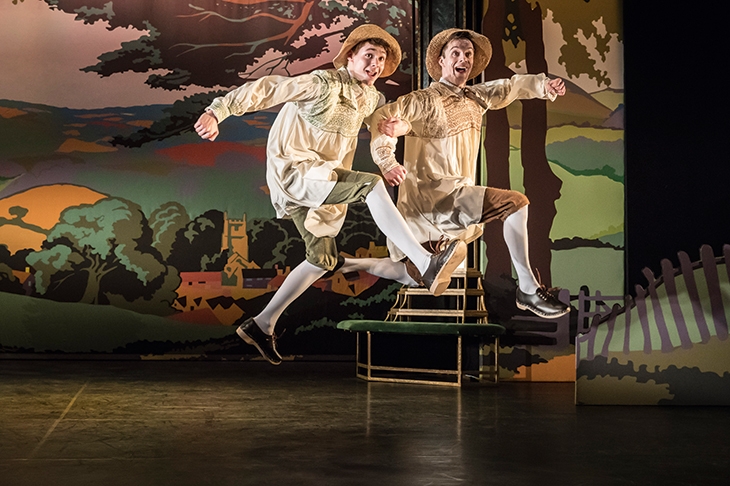‘Modern’ dance was no laughing matter in 1987. Harold King, director of the now-defunct London City Ballet, cattily typified it as ‘lesbians in bovver boots playing a mouth organ and banging a drum on the banks of the Thames’. Camp, funny and unashamedly ‘accessible’, even Matthew Bourne’s earliest efforts were a far cry from the earnest output of his more contemporary contemporaries as his 30th anniversary retrospective, Early Adventures, reminds us.
Bourne’s early pieces were conceived on a modest scale with taped music and only a handful of dancers, but the works in the current triple bill show that his gift for creating character and narrative was evident from the start. The young man from Walthamstow had spent his stage-struck youth watching plays, musicals, ballets and vintage movies with a magpie eye, saving up gestures and steps that would be refashioned into his work.
He came unusually late to formal dance training, signing up for a BA at London’s Laban Centre at the age of 22. The Laban was never intended as a technical hothouse (the Times’s John Percival always privately referred to it as ‘the Banal Centre’) but it taught Bourne how to structure his ideas and fed his passion for dance history.
The programme is packed with balletic and cinematic in-jokes but the most striking thing about the triple bill is its extraordinary, warm-beer-and-bicycles take on all things English. ‘Watch With Mother’ and ‘Town and Country’ feature lashings of Eric Coates and Percy Grainger, riding breeches, yokel smocks and a mile of grey flannel. Even the larky ‘Infernal Galop’, made in 1989 to mark the bicentenary of the French Revolution, shows the French through English eyes with a full house of Gallic clichés (berets, matelots, pissoirs) and a garlicky playlist of Trenet, Piaf and Offenbach.
‘Watch With Mother’ (1991) is probably the weakest piece of the evening but the cast of overgrown children act out the sketches with galumphing glee — nothing so creepy and revealing as grown-ups in shorts and gymslips. Bourne’s go-to family of stock characters — the frump, the wimp, the bully — can all be glimpsed in embryo as they lumber through Joyce Grenfell’s glorious Music and Movement pastiche.
Sir Matthew’s fame (and fortune) was made by his full-evening dance dramas. His 1995 Swan Lake, with its unhappy modern Prince and its scary skein of male swans, tapped into an unsuspected appetite for dance theatre. This international hit was followed by versions of Cinderella, Carmen, Edward Scissorhands and last winter’s Red Shoes, but until 1992, when he made his first narrative piece, a version of The Nutcracker, he favoured a revue-like format. This can render works like ‘Town and Country’ bitty and prolix but it also guarantees plenty of emotional and stylistic variety.
A lifelong affection for the ballets of Frederick Ashton sets the tone for the rural idyll of ‘Town and Country’. It is set to Percy Grainger and packed with bare-faced borrowings from La Fille mal gardée (ribbons and clog dance) and Façade (the saucy cow’s udder motif). Bourne shares Ashton’s flair for character comedy but also has his gift for sudden cloudy spells of serious emotion. These rapid changes of tone are made possible by the cast’s tragicomic timing and by nifty, economical transformations. In ‘Town’, a railway clock and a gust of steam transport us from a hotel lobby to Brief Encounter’s station tea room (a setting that Bourne — an inveterate recycler — revisits in his Cinderella).
‘Town’s most memorable vignette features two men slyly eyeing each other up in the hotel lounge. The older man (created by Bourne himself back in 1991) is pure Rattigan in blazer and cravat and his new friend is primly prodding at his needlepoint. They seem set fair for farce but their cautiously coded exchange blossoms into a swoony duet to Noël Coward’s ‘Dearest Love’, a lovestruck walk in rhythm with unmistakable echoes of the ‘Popular Song’ duet from Façade (more Ashton).
Other dancemakers have fashioned male duets (Lloyd Newson, Russell Maliphant et al) but most degenerate into muscle-bound shows of strength. Bourne deploys a lifetime of dance and movie-going to craft a pas de deux of extraordinary wit and sweetness, matching the tenderness of Coward’s lyric (‘I saw your strange elusive smile/ And all my life was altered’), striking the same note of understated ecstasy.






Comments